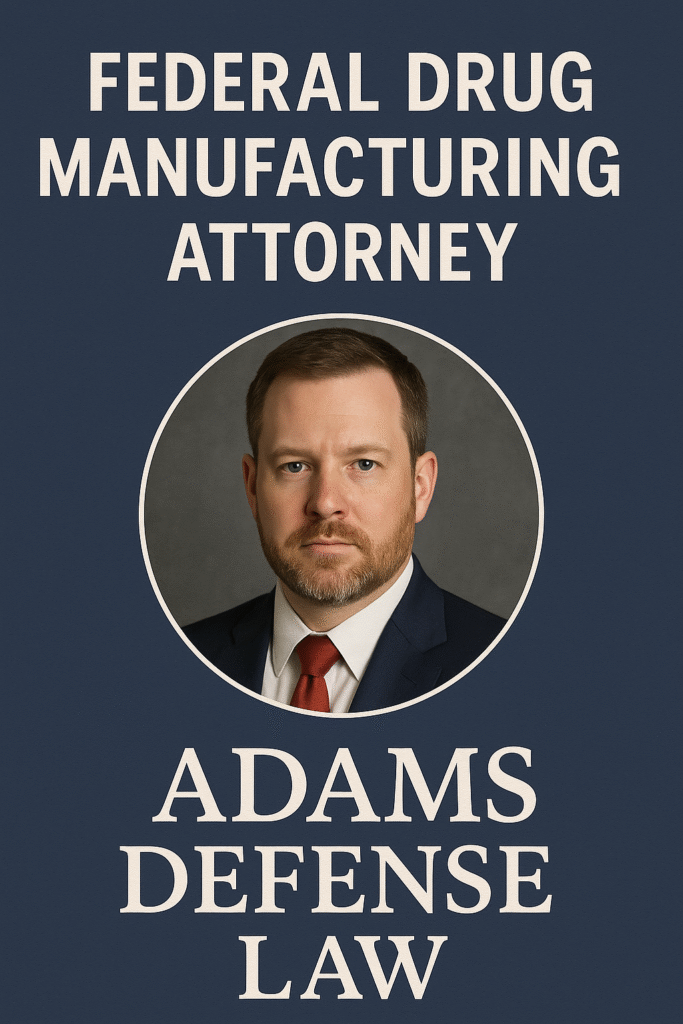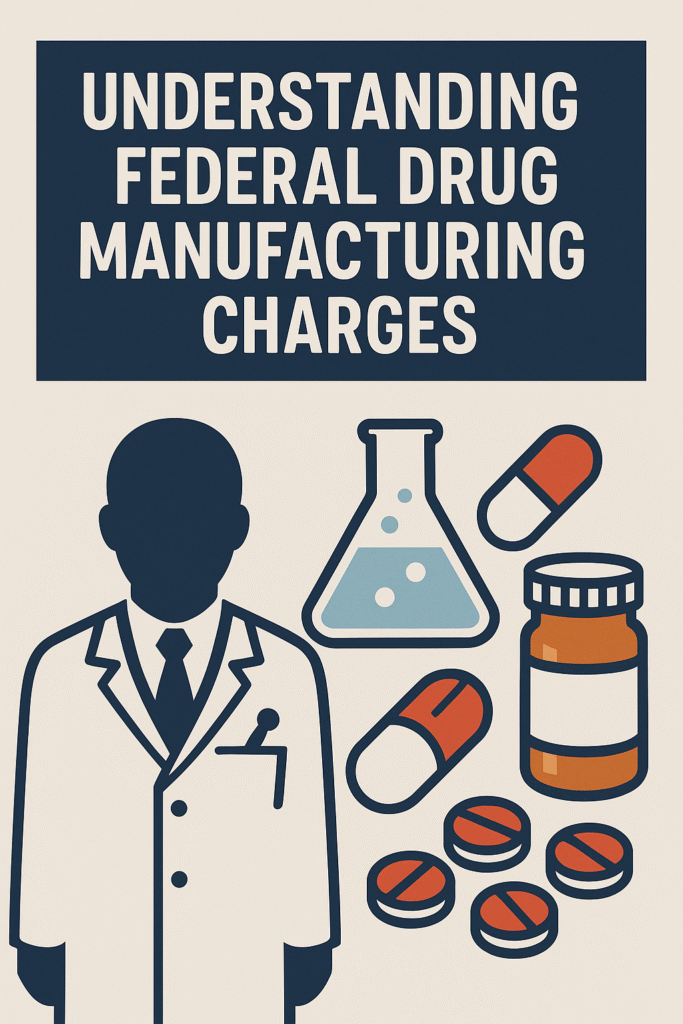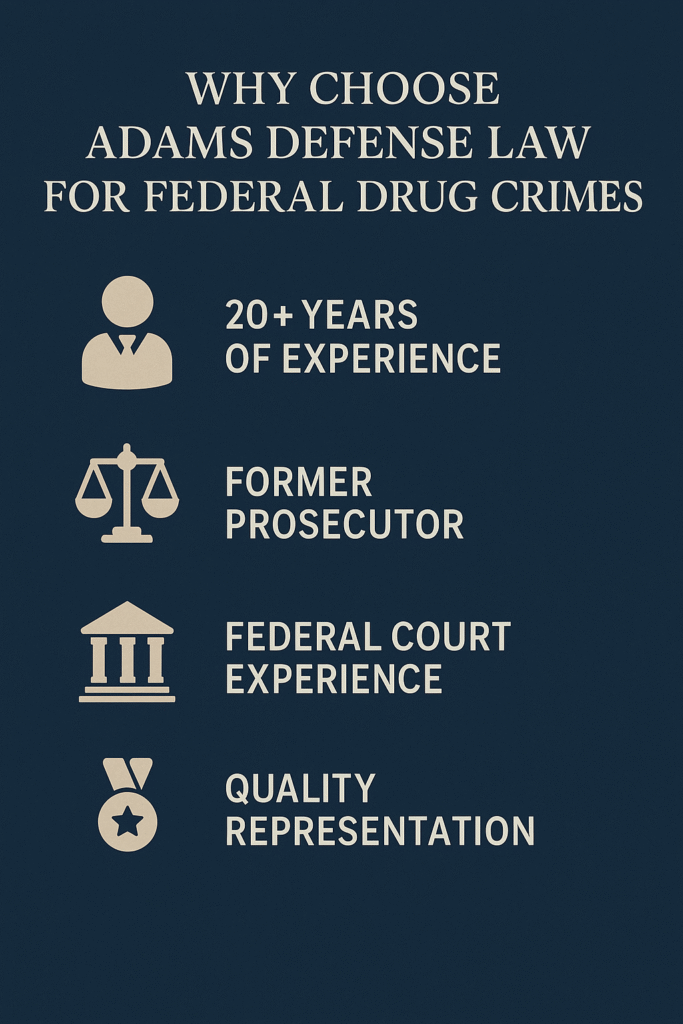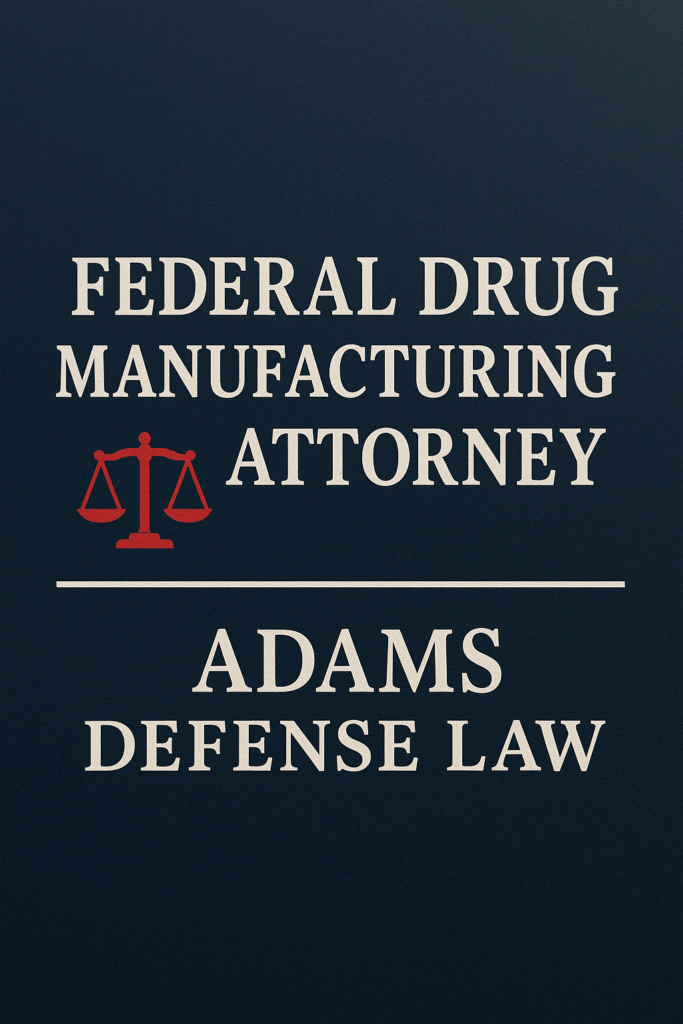Federal Drug Manufacturing Law
Federal Drug Manufacturing Attorney – Chicago, NYC, Kansas City
Experienced federal criminal defense lawyer providing aggressive representation for drug manufacturing charges, including methamphetamine labs, fentanyl production, and precursor chemical violations.
Federal drug manufacturing charges represent some of the most complex and severely penalized offenses in the federal criminal justice system. These cases often involve sophisticated scientific evidence, hazardous materials violations, and enhanced penalties that can result in decades of imprisonment. Manufacturing charges frequently include additional federal violations such as environmental crimes, firearms offenses, and conspiracy allegations that compound the potential consequences.
Attorney Josh Adams at Adams Defense Law has extensive experience defending clients against federal drug manufacturing charges in Chicago, New York City, and Kansas City. Our approach combines technical expertise with aggressive legal advocacy to challenge the government’s scientific evidence, protect constitutional rights, and achieve the best possible outcomes in these complex federal prosecutions.
Call (312) 566-9173 for immediate consultation or complete our confidential case evaluation to discuss your federal manufacturing charges.


Understanding Federal Drug Manufacturing Charges
Federal drug manufacturing is prosecuted under 21 U.S.C. § 841(a)(1), which prohibits the manufacture of controlled substances. Unlike possession or distribution charges, manufacturing cases involve the creation or production of illegal drugs, often requiring proof of sophisticated operations, specialized equipment, and dangerous chemical processes.
Manufacturing charges encompass various activities including:
- Operating clandestine laboratories for drug production
- Processing raw materials into finished controlled substances
- Mixing, compounding, or converting substances into illegal drugs
- Supervising or directing manufacturing operations
- Providing equipment, chemicals, or expertise for drug production
Elements of Federal Manufacturing Charges
To prove federal drug manufacturing, prosecutors must establish:
Manufacturing Activity: Evidence that the defendant engaged in the production, creation, or synthesis of controlled substances through chemical processes.
Knowledge and Intent: The defendant knew they were manufacturing controlled substances and intended to produce illegal drugs.
Federal Jurisdiction: The manufacturing activity occurred in or affected interstate commerce, typically established through interstate movement of chemicals, equipment, or finished products.
Controlled Substance Identity: The manufactured substance is listed in federal controlled substance schedules.
Enhanced Penalties for Manufacturing
Manufacturing charges often carry enhanced penalties compared to other drug offenses due to:
Public Safety Hazards: Manufacturing operations create significant risks to public health and safety through toxic chemicals, fire hazards, and environmental contamination.
Commercial Scale Operations: Manufacturing typically indicates large-scale drug distribution networks rather than personal use activities.
Specialized Knowledge: Manufacturing requires expertise and premeditation, suggesting sophisticated criminal enterprises.
Environmental Damage: Manufacturing operations often cause significant environmental contamination requiring expensive cleanup efforts.
Types of Federal Manufacturing Cases
Methamphetamine Manufacturing
Methamphetamine manufacturing represents the most commonly prosecuted federal manufacturing offense, involving dangerous chemical processes and toxic waste production.
Common Manufacturing Methods:
- Red phosphorus and iodine methods using pseudoephedrine
- Anhydrous ammonia processes with lithium metal
- One-pot or shake-and-bake methods in portable containers
- Large-scale superlabs producing commercial quantities
Typical Evidence:
- Laboratory equipment including glass apparatus, heating elements, and mixing devices
- Precursor chemicals such as pseudoephedrine, red phosphorus, and anhydrous ammonia
- Recipe books, instructions, or internet searches for manufacturing methods
- Toxic waste and contaminated materials from manufacturing processes
Defense Strategies:
- Challenging the identification and functionality of alleged laboratory equipment
- Questioning the defendant’s knowledge of manufacturing processes
- Examining search warrant validity and execution procedures
- Investigating environmental testing and contamination evidence
Fentanyl Manufacturing
Fentanyl manufacturing cases have increased dramatically due to the opioid crisis and often involve small quantities of extremely potent substances.
Manufacturing Characteristics:
- Small-scale operations producing highly potent products
- Importation of precursor chemicals from foreign sources
- Mixing fentanyl with other substances to create counterfeit pills
- Internet-based ordering of manufacturing equipment and chemicals
Unique Challenges:
- Extremely low quantity thresholds triggering severe penalties
- Dangerous exposure risks during investigation and evidence handling
- Complex chemical analysis requirements for fentanyl analogs
- International sourcing of precursor materials
Defense Approaches:
- Challenging fentanyl analog identification and scheduling
- Questioning quantity calculations and purity determinations
- Examining international shipping and customs procedures
- Investigating laboratory safety and testing protocols
Synthetic Drug Manufacturing
Synthetic drug manufacturing involves creating new psychoactive substances often designed to circumvent existing drug laws.
Common Synthetic Drugs:
- Synthetic cannabinoids (K2, Spice)
- Synthetic cathinones (bath salts)
- Synthetic hallucinogens (25I-NBOMe, 2C compounds)
- Designer stimulants and depressants
Legal Complications:
- Analog Act applications to new synthetic compounds
- Scheduling determinations for novel substances
- International sourcing of precursor materials
- Rapidly changing legal status of synthetic compounds
Defense Strategies:
- Challenging controlled substance scheduling and analog determinations
- Questioning the scientific basis for analog classifications
- Examining international law and treaty compliance
- Investigating laboratory testing and identification procedures
Prescription Drug Manufacturing
Illegal manufacturing of prescription medications involves creating counterfeit versions of legitimate pharmaceuticals.
Common Scenarios:
- Counterfeit oxycodone, Xanax, and Adderall production
- Pill pressing operations creating fake prescription medications
- Adding fentanyl to counterfeit prescription drugs
- Large-scale distribution of counterfeit pharmaceuticals
Federal Violations:
- Drug manufacturing charges under the Controlled Substances Act
- Trademark violations for counterfeit pharmaceutical markings
- FDA violations for unapproved drug manufacturing
- Mail fraud charges for interstate distribution
Precursor Chemical Violations
Federal law strictly regulates chemicals used in drug manufacturing, creating separate criminal liability for precursor chemical violations.
Listed Chemicals and Regulations
List I Chemicals: Essential chemicals used directly in drug manufacturing
- Pseudoephedrine and ephedrine (methamphetamine precursors)
- Phenylacetic acid (methamphetamine and amphetamine precursor)
- Piperidine (PCP precursor)
- Anthranilic acid (methaqualone precursor)
List II Chemicals: Important chemicals used in drug manufacturing
- Acetic anhydride (heroin processing)
- Acetone and methyl ethyl ketone (cocaine processing solvents)
- Potassium permanganate (cocaine purification)
- Toluene (cocaine processing solvent)
Precursor Chemical Offenses
Possession with Intent to Manufacture: Possessing listed chemicals with intent to manufacture controlled substances.
Distribution of Listed Chemicals: Selling or transferring listed chemicals knowing they will be used for illegal drug manufacturing.
Failure to Report Transactions: Licensed handlers failing to report suspicious transactions or maintain required records.
Importation Violations: Illegally importing listed chemicals without proper permits and documentation.
Federal Manufacturing Penalties
Federal drug manufacturing penalties are among the most severe in criminal law, often exceeding those for trafficking equivalent quantities of finished drugs.
Base Penalties by Drug Type
Methamphetamine Manufacturing:
- Any amount: Up to 20 years imprisonment
- 50 grams or more (pure): 5-year mandatory minimum
- 500 grams or more (pure): 10-year mandatory minimum
Fentanyl Manufacturing:
- Any amount: Up to 20 years imprisonment
- 40 grams or more: 5-year mandatory minimum
- 400 grams or more: 10-year mandatory minimum
Other Controlled Substances:
- Schedule I or II: Up to 20 years imprisonment
- Schedule III: Up to 10 years imprisonment
- Schedule IV: Up to 5 years imprisonment
- Schedule V: Up to 1 year imprisonment
Enhanced Penalties
Environmental Hazards: Manufacturing operations creating substantial environmental contamination can result in additional penalties of up to 5 years imprisonment.
Death or Serious Injury: Manufacturing resulting in death or serious bodily injury carries penalties up to life imprisonment.
Firearms Involvement: Manufacturing operations involving firearms carry mandatory consecutive sentences of 5 years to life.
Prior Convictions: Previous drug felony convictions double mandatory minimum sentences and can result in life imprisonment.
Continuing Criminal Enterprise: Large-scale manufacturing operations may trigger CCE charges carrying 20 years to life imprisonment.
Defense Strategies for Manufacturing Cases
Defending federal manufacturing charges requires specialized knowledge of chemistry, environmental science, and complex federal regulations.
Technical and Scientific Challenges
Laboratory Analysis: Independent analysis of alleged manufacturing evidence is crucial for effective defense.
- Challenging government chemist qualifications and testing procedures
- Obtaining independent laboratory analysis of seized materials
- Questioning contamination and sample integrity issues
- Examining equipment functionality and manufacturing capability
Manufacturing Process Analysis: Understanding the actual manufacturing processes is essential for challenging government theories.
- Consulting with chemistry experts to evaluate alleged manufacturing methods
- Challenging the viability of seized equipment for drug production
- Questioning the completeness of alleged manufacturing operations
- Examining yield calculations and production capacity estimates
Constitutional Challenges
Fourth Amendment Violations: Manufacturing investigations often involve extensive searches that may violate constitutional protections.
- Challenging search warrant applications and supporting affidavits
- Questioning the scope and duration of property searches
- Examining aerial surveillance and thermal imaging constitutional issues
- Investigating warrantless emergency searches and exigent circumstances
Fifth Amendment Issues: Manufacturing cases frequently involve complex interrogations and scientific evidence.
- Suppressing statements obtained during custodial interrogations
- Challenging grand jury proceedings and immunity grants
- Protecting against compelled self-incrimination during expert consultations
- Examining Miranda compliance during on-scene questioning
Environmental and Safety Challenges
Hazmat Procedures: Manufacturing investigations often involve hazardous materials that require specialized handling.
- Challenging law enforcement training and certification for hazmat handling
- Questioning contamination prevention during evidence collection
- Examining officer and public safety during search execution
- Investigating proper disposal of hazardous materials and waste
Environmental Testing: Government environmental testing may be flawed or incomplete.
- Obtaining independent environmental analysis of contamination claims
- Challenging EPA and state environmental agency testing procedures
- Questioning baseline contamination levels and pre-existing conditions
- Examining remediation cost calculations and necessity
Working with Adams Defense Law
Immediate Response to Manufacturing Charges
Emergency Consultation: Manufacturing charges require immediate attention due to their complexity and severe penalties. We provide comprehensive case evaluation and strategic planning from the first contact.
Scientific Team Assembly: We immediately begin assembling a team of chemists, environmental experts, and former law enforcement specialists who understand manufacturing investigations.
Evidence Preservation: Manufacturing cases involve perishable evidence and contaminated materials that require immediate attention to preserve defense options.
Comprehensive Technical Defense
Expert Witness Coordination: We work with qualified chemists, environmental scientists, and manufacturing experts who can challenge the government’s scientific evidence and provide alternative explanations.
Independent Laboratory Analysis: We arrange for independent analysis of all seized materials, chemicals, and alleged manufacturing equipment to challenge government conclusions.
Environmental Impact Assessment: We conduct independent environmental testing to challenge government contamination claims and remediation cost estimates.
Strategic Legal Advocacy
Constitutional Motion Practice: We file comprehensive pretrial motions challenging searches, seizures, and interrogations while protecting all constitutional rights.
Scientific Evidence Challenges: We thoroughly examine government laboratory reports, testing procedures, and expert witness qualifications to identify weaknesses and errors.
Penalty Mitigation: We explore all available options for reducing penalties, including safety valve provisions, cooperation agreements, and alternative sentencing programs.
Related Federal Drug Defense Services
Our manufacturing defense practice integrates with our comprehensive federal drug crime representation:
Federal Drug Crimes Overview → – Understanding how manufacturing charges fit within broader federal drug enforcement priorities and prosecution strategies.
Federal Drug Trafficking Defense → – Manufacturing cases often include trafficking allegations requiring coordinated defense strategies.
Federal Drug Conspiracy Defense → – Manufacturing operations frequently involve multiple defendants and conspiracy charges requiring specialized multi-defendant defense approaches.
Federal Drug Distribution Defense → – Manufacturing charges often include distribution allegations that must be addressed comprehensively.
Connection to State Drug Defense
Our federal manufacturing defense builds on extensive experience with related state charges:
Chicago Drug Defense → – Understanding how state manufacturing investigations can escalate to federal prosecution and how local law enforcement coordinates with federal agencies.
Federal Agencies in Manufacturing Investigations
Drug Enforcement Administration (DEA)
DEA leads most federal manufacturing investigations through specialized units:
- Clandestine Laboratory Enforcement Team (CLET) operations
- Mobile enforcement teams for laboratory dismantling
- Precursor chemical diversion investigations
- International coordination for chemical sourcing investigations
Environmental Protection Agency (EPA)
EPA involvement focuses on environmental contamination and cleanup:
- Environmental assessment of contaminated manufacturing sites
- Hazardous waste disposal and remediation oversight
- Criminal enforcement of environmental violations
- Cost recovery for environmental cleanup expenses
Bureau of Alcohol, Tobacco, Firearms and Explosives (ATF)
ATF participation typically involves explosive and firearms violations:
- Explosive manufacturing and storage violations
- Firearms possession by prohibited persons
- Interstate firearms trafficking connected to manufacturing operations
- Arson investigations related to laboratory explosions or fires
Occupational Safety and Health Administration (OSHA)
OSHA may be involved in workplace safety violations:
- Hazardous chemical exposure violations
- Workplace safety standard violations
- Employee protection requirement violations
- Industrial hygiene and safety compliance issues
Environmental Consequences of Manufacturing
Contamination Issues
Manufacturing operations often create significant environmental contamination requiring expensive remediation:
Soil Contamination: Chemical spills and waste disposal contaminate soil requiring excavation and treatment.
Groundwater Contamination: Chemical infiltration into groundwater supplies creates long-term environmental damage.
Air Quality Issues: Toxic fumes and chemical vapors create air quality hazards for surrounding communities.
Structural Damage: Chemical corrosion and toxic exposure damage buildings and infrastructure.
Cleanup and Remediation Costs
Environmental cleanup costs can reach hundreds of thousands of dollars and may be imposed as restitution:
Assessment Costs: Environmental testing and assessment expenses Remediation Expenses: Soil excavation, groundwater treatment, and air quality restoration Monitoring Costs: Long-term environmental monitoring and testing Property Restoration: Building demolition and reconstruction when necessary
Time-Sensitive Defense Considerations
Manufacturing charges require immediate attention due to their complexity and severe consequences:
Scientific Evidence Preservation: Chemical evidence degrades over time, making immediate independent analysis crucial for effective defense.
Environmental Testing: Independent environmental assessment must be conducted quickly to challenge government contamination claims.
Expert Witness Retention: Qualified chemistry and environmental experts have limited availability and must be retained immediately.
Detention Hearings: Manufacturing defendants often face pretrial detention based on public safety concerns and flight risk allegations.
Protect Your Future: Contact Adams Defense Law Now
Federal drug manufacturing charges can result in decades in prison and catastrophic environmental liability. These complex cases require immediate attention from attorneys with specialized technical knowledge and federal criminal defense experience.
Get immediate help:
- Call (312) 566-9173 for urgent consultation
- Complete our confidential case evaluation for comprehensive case analysis
Attorney Josh Adams provides aggressive federal manufacturing defense in Chicago, New York City, Kansas City, and federal courts nationwide. We understand the technical complexities of manufacturing cases and are available 24/7 for criminal defense emergencies.
Don’t wait – the scientific evidence in your case may be deteriorating. Contact us immediately to protect your rights and begin building your technical defense against federal manufacturing charges.
This information is provided for educational purposes and does not constitute legal advice. Federal drug manufacturing cases involve complex scientific and legal issues requiring specialized analysis. Case outcomes depend on specific technical facts and circumstances.
Why Choose Adams Defense Law for Federal Drug Crimes
Proven Federal Court Experience
Attorney Josh Adams has extensive experience defending clients in federal court across multiple jurisdictions. This experience is crucial when facing the complex procedural and substantive challenges of federal drug prosecutions.
Multi-Jurisdictional Practice
With active practice in Chicago, New York City, and Kansas City federal courts, Adams Defense Law can provide consistent representation regardless of where your case is being prosecuted.
Comprehensive Case Investigation
We conduct thorough investigations of every case, including:
- Independent forensic analysis
- Expert witness consultation
- Investigation of law enforcement procedures
- Discovery of exculpatory evidence
Client-Centered Approach
We understand that federal drug charges can devastate individuals and families. Our approach focuses on:
- Clear communication throughout the process
- Realistic assessment of case strengths and weaknesses
- Exploration of all available defense options
- Preparation for trial when necessary

Contact Federal Drug Lawyers
Contact Our Federal Criminal Defense Attorney
If you’re facing federal charges or under federal investigation in Chicago, New York City, or Kansas City, time is critical. Federal cases move quickly once charges are filed, and early intervention can significantly impact your case outcome.
Call (312) 566-9173 for immediate consultation
Available 24/7 for:
- Federal arrests and detention hearings
- Grand jury subpoenas and target letters
- Federal search warrants
- Emergency federal court matters
Office Locations:
Chicago Office (Primary) Adams Defense Law
(312) 566-9173 info@adamsdefenselaw.com
Free Consultation: All federal criminal defense consultations are confidential and protected by attorney-client privilege.
Get Your Free Criminal Case Evaluation
Disclaimer: This website provides general information about federal criminal defense. It does not constitute legal advice and does not create an attorney-client relationship. Federal criminal cases are complex and fact-specific. Consult with an experienced federal criminal defense attorney for advice about your specific situation

